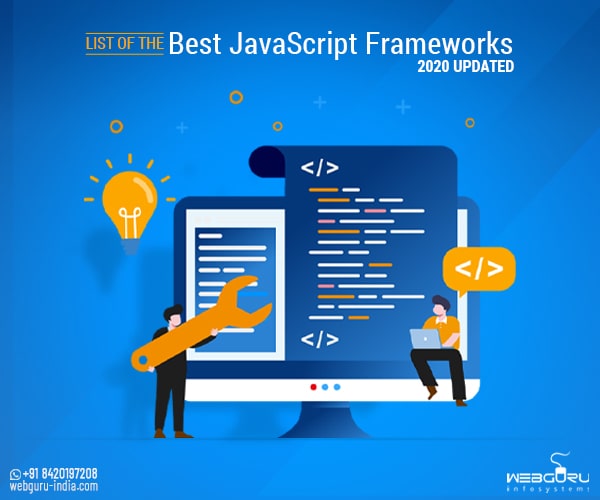Home Blog Web Application Development List of the Best JavaScript Frameworks – 2020 Updated
List of the Best JavaScript Frameworks – 2020 Updated
- 07 Sep / 2020
- 6,444 views

JavaScript is a multi-paradigm language to support functional, event-driven, and imperative (both prototype-based and object-oriented) programming styles. In Stackoverflow’s developer survey, with 67.7% people opting for it, JS is voted as the most popular language for the 8th year in a row. The major reason for its popularity is the fact that JS is extremely versatile and can be used for both front and backend development as well as for testing websites or applications.
The availability of a number of frameworks makes the process even smoother. A software framework enables the developers to selectively change the software-provided generic functionality by implementing additional user-written code. Written in JavaScript, JS frameworks allow the programmers to manipulate the functions of the web apps and use them as per their convenience.
While Googling ‘JavaScript framework’, you’ll be flooded with numerous names, each with their own advantages and limitations. With so many choices for JS frameworks for frontend and backend development, or even testing, it’s difficult to choose the right one for your project.
You need not worry as we are here with handpicked JS frameworks ideal for a full-stack development and even testing. Without further ado, let’s proceed then.
Frontend JS Frameworks
1. Angular
Angular is an open-source typescript based framework by Google, mainly used for developing the front-end of single-page web applications. As per a survey by Wappalyzer, around 3.6 million applications are built with Angular. This is reportedly the highest figure for any front end JS framework.
Advantages of Angular
- Angular AOT (Ahead-of-Time) compiler can convert HTML and TypeScript into JS during the development process. This ensures that the codes are compiled even before the browser loads a web app. That way, it’s rendered faster. Also, an AOT compiler is more secured than a JIT or Just-in-Time compiler.
- Angular has a superb collection of third-party integrations to enhance the appeal and performance of the web applications. It is also ideal for enterprise-scale app development.
- The component-based architecture of Angular facilitates reusability. These can be used several times throughout the app. As a result, it ensures enhanced code readability and ease of maintenance.
- Angular can be used as a front-end web development tool for the programming languages like PHP, Node.js, .Net, Java Struts and Spring and many other servers to ensure almost instant rendering in just HTML and CSS. If you have a concern to make your web application SEO friendly, Angular can be your best bet.
- Angular apps are fast and can load seamlessly with the new Component Router. It delivers automatic code-splitting and allows the users to load only the essential codes for rendering the view they’ve requested.
- Angular provides instant error-check, intelligent code completion, and many more feedback in popular editors and IDEs.
All these benefits perhaps made you understand the reason for the increasing demand of Angular development services in the contemporary industry.
Limitations of Angular
- Compared to the alternatives like React and Vue.js, Angular is bulkier and larger in size. That’s why developers often prefer the other two frameworks for small-scale application development.
- Dependency injection in Angular is somewhat time-consuming.
Popular Web Applications Built with Angular
- Walmart, Delta, Google, Upwork, Udacity.
2. React
It is an open-source JS library (not a full-fledged framework). React has offered a real breakthrough in shaping modern web applications. It has a component-based, declarative, and functional programming style for creating an interactive UI (User Interface) mainly for single-page web apps. It delivers outstanding rendering by using “Virtual DOM”. It renders only the modified components instead of rendering the entire page. Another significant feature of React is its use of simpler JSX (JavaScript XML) syntax instead of JavaScript.
71.7% of JS devs currently use React and it has been ranked as the best front end JS framework in the State of JS survey.
Advantages of React
- React’s reusable components enable the developers to import and reutilize the UI components without taking the pain of coding from scratch every single time.
- It allows easy integration with other front and back-end frameworks such as the popular PHP framework Laravel without any hassle. That’s why it is the best pick for many full-stack web development agencies.
- A fundamental advantage of React is that it is based on one-directional data flow architecture instead of a 2-way data binding approach adopted by Angular. This makes the codes more stable and less vulnerable.
- With its new features like Concurrent Mode, Hooks, Fiber, Suspense, etc. the framework reduces boilerplate code, improves concurrency and ensures fast rendering and brilliant performance. Got the reasons behind the increasing demand for React development services?
Limitations of React
- React deals with only the View Layer of the MVC (Model-View-Controller) pattern. So the devs need to rely on other technologies for the Model-Controller layer.
Popular Web Applications Built with React
- Netflix, Facebook, WhatsApp, Airbnb, Instagram, Twitter.
Confused which one is better between Angular and React? This blog will help you find the answer!
3. Vue.js
Launched in 2014, the open-source lightweight JS framework is used for building creative user interface and high performing single page web apps. Vue.js has adopted various features from Angular and React and made some major improvements on those to offer an easy to use and secure framework. For instance, it offers Virtual DOM as found in React and 2-way data binding as found in Angular. Due to its progressive, unrestrictive and simple nature, it easily adapts to the developers’ requirements. No wonder that all the leading website development company professionals rely on this framework for their projects.
Advantages of Vue.js
- Its simple structure enables the developers to code easily with type-less syntax.
- Its inbuilt MVC ensures an easy and quick configuration, unlike React.
- It has a surprising lightweight size (around 18-20 kb)
- Its 2-way data binding facilitates HTML attribute manipulation, change the styles, and assign classes with v-bind available.
Limitation of Vue.js
- Vue.js, though found a wide market in the USA and China, has a small community. However, it is gradually gaining popularity due to its dev-friendly approach.
Popular Web Applications Built with Vue.js
- Apple Swift UI, Adobe, BMW, Louis Vuitton, Trivago
Backend JS Frameworks
One of the reasons behind the wild popularity of JavaScript as a programming language is that it can be used both for front and back-end development. We will discuss a few back-end frameworks in the following sections.
1. Node.js
Node.js is a server-side JS runtime environment (often referred to as a framework). Its event-driven architecture is capable of driving asynchronous I/O (input/output). This enhances the performance speed of the applications.
Now, as we mentioned, Node.js is basically a runtime environment. The framework for this is Express.js. This open-source Node.js framework is popular for developing APIs and web applications. Over 71% of developers prefer it as the best JS framework for the backend and recommend businesses to engage Nodejs development services without any hesitation.
Advantages of Node.js
- It is highly scalable and follows an event mechanism process. This enables the server to respond in a non-blocking way.
- Node.js (and Express.js) is ideal for real-time application development as it doesn’t cause data-buffering.
- It offers a seamless connectivity with the popular and widely used databases like Redis, MySQL, and MongoDB.
- Popular template engines such as EJS, HAML, Pug, etc. work surprisingly well with Express.js.
- Node.js promotes an easy learning curve. Coding in Node.js is quite simple if you have a grasp in JavaScript and Object-Oriented Programming basics. All you need is to be acquainted with the client-server model and catch up with Node’s asynchronous workflow.
- Before launching an app, the startups often face many challenges. No wonder that they want to opt for an easy solution. With Node.js, they enjoy sharing one language across the server and client sides, and don’t have to switch between back-end and front-end.
- This also means that the web apps written in Node.js demand fewer files and lesser codes as compared to those with distinct languages used in front and back-end. You can also reiterate the codes and share these between the client and server sides of your application. Naturally, it speeds up the development process. Single code, single deployment – everything in one place.
- Another crucial fact that the technology is extremely lightweight and can significantly reduce the app development time without affecting its robust functionality. From ideation to implementation – Node.js smoothens the development journey. Availability of immediate feedback from the deployment environment also helps in this.
Limitation of Node.js
- Express doesn’t offer any security solution in itself. So ensuring the quality of the code is completely in the hands of the developers.
Popular Web Applications Built with Node.js
- Myntra, PayPal, Uber, Unsplash, Fox, GoDaddy, Twitter.
2. Next.js
This is an end-to-end backend rendering framework based on React. Unlike Gatsby, which is also based on React, it is not a static site generator and essentially a Server Side Renderer (SSR). Over 34K web applications are developed using Next.js.
Advantages of Next.js
- Its SSR delivers a fast performance as it need not wait for the client’s browser to load JS and show content. SSR starts to render HTML from the server far before the JS code is downloaded in the client’s browser. That way, initial rendering of the app is available while the code is still processing in the background.
- It has an automatic code-splitting feature that allows the developers to break down the application code into a series of little bundles that can be loaded individually as required without having to load the entire JS code. This delivers optimal performance.
Limitations of Next.js
- Next.js is built specifically to comply with React.
- Some developers often opine that its performance benchmark is somewhat inferior to Nuxt and Gatsby.
Popular Applications Built with Next.js
- Starbucks, Twitch, Uber, Github.
3. Nuxt.js
This is a progressive framework based on Vue.js ecosystem. However, it cannot be tagged as a full-fledged backend framework like Express.js. It features various official Vue components and libraries like Vue, Vue server renderer, Vue Router, Vue meta, etc. With Nuxt, the developers can build three types of web apps – Server Side Rendered (SSR) applications, single-page web application (SPA), and pre-rendered static page app.
Advantages of Nuxt.js
- Nuxt.js facilitates the initial setup and configuration steps so the developers can get straight to coding, without losing much time.
- It is also used in creating universal apps. Unlike traditional single-page applications that often face slow loading time and substandard SEO performance, universal apps make it easier for the search engine bots to crawl the site content and offer great loading speed and improve SEO performance.
Limitation of Nuxt.js
- Integrating custom libraries can be a bit troublesome with Nuxt.js.
- Debugging issues can be frustrating and challenging while using it.
Popular Applications Built with Nuxt.js
- Upwork, Fox News, Bitpay, Roland Garros.
JS Testing Frameworks
Yet another important facility of JavaScript is that it can be used for testing websites and applications. JS testing frameworks are increasingly gaining popular for end-to-end testing, integration testing and unit testing. Here are some of the advanced JS testing frameworks:
1. Mocha
Mocha is a feature-rich JavaScript testing framework which runs on Node.js and in the browser. It ensures to make asynchronous testing hassle-free. Mocha tests run serially in a flexible manner and offer accurate reporting.
It supports both BDD (Behaviour Driven Development) and TDD (Test Driven Development) environments for JS automated testing. Its simplicity and flexibility of use make it a prominent JS testing framework for the devs.
2. Jasmine
This is a BDD or Behaviour Driven Development framework. The scalable testing framework is compatible with various frameworks libraries. No wonder that it received 14.8K stars on Github.
3. Jest
Jest takes the simplicity of a JS automated testing to a whole new level. It provides decent cross browser support. Over 60% of developers have picked it as their favourite JS testing framework (source – the State of JS survey).
Wrapping Up
Before concluding, we just want to mention that every framework has its unique advantages and shortcomings. So, analyze your project requirement before heading to pick the right framework. Other than its efficiency and cost; complexity, community support, compatibility – all these factors must be taken into account before engaging or offering web application development services.
We hope you have got a deeper understanding of the best JS frameworks available at the current time. Good luck with your next project!

Surajit Das
Surajit Das has vast experience in web app development. His expertise in various programming languages & frameworks is reflected in the blogs.
3 comments
Leave a Reply

-
1000+
Happy
Clients -
25+
Countries
Served -
19+
Years of
Trust








Thank you for sharing such useful information.
I’m definitely enjoying your blog and look forward to new updates.
Nice post. Have a great day!